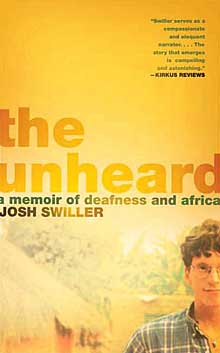‘The Unheard: A Memoir of Deafness and Africa’
Travel Books: In his new book, Josh Swiller writes that he wanted to find "a place beyond deafness." Reviewer Frank Bures believes he found it -- and much more -- amid the conflict and half-dug wells of a small corner of Zambia.
09.12.07 | 11:00 AM ET
 Zambia is a country we don’t hear much about these days. It seems like a quiet place, peaceful but poor. Maybe even in need of a little help. Underneath, of course, lies more.
Zambia is a country we don’t hear much about these days. It seems like a quiet place, peaceful but poor. Maybe even in need of a little help. Underneath, of course, lies more.
Josh Swiller was part of the first group of Peace Corps volunteers sent to the country to help start development projects in the mid-1990s, a time he recounts in his great new book, The Unheard: A Memoir of Deafness and Africa.
Swiller was a brave man, heading to Africa with severely limited hearing—and no hearing without his hearing aids. But he went as much with the notion of doing good as with finding “a place beyond deafness.” In the end, he found that place and much more.
When Swiller arrived at his post in the town of Mununga, a dusty place with no electricity, no running water and bad roads, he had no idea how little he knew. His job was to get people to help him dig wells. People didn’t want to dig wells, no matter how good an idea it was. At least not for free. That was hard for Swiller to see at first. In fact, everything was hard for him to see in the beginning, and one of the first things Swiller unknowingly did was antagonize the most powerful man in the village, Boniface, by accusing him of extortion. This set the tone for two years of conflict.
Reading Swiller’s thoughtful account of those two years brings to mind a problem with a lot of travel writing, and one we all face when we travel: the problem of surfaces. In the early- to mid-1900s, this wasn’t a problem. Travel writing served the purpose of describing places and events. Things have changed. These days, as Rory MacLean says, “it is no longer enough to travel across a country, rather one must travel into it. Into its society. The travel writer becomes less a geographer of place, more of the human heart.”
This is not as easy as it sounds, partly because most of us simply don’t have access to the societies we travel through in any meaningful way. But a subgenre of travel literature, including books like Peter Hessler’s River Town and Tom Bissell’s Chasing the Sea, gets around this because the writers actually become part of the societies they write about, as much as possible.
Swiller’s book reminded me that these books about such deep travel make some of the most satisfying travel books. They let readers see the world from inside out. They let readers glimpse the true workings of a place. At their best, they are the most unvarnished and real narratives of foreignness. “The Unheard” is this kind of book at its best.
After a few months of trying to get people to dig wells, Swiller’s boss tells him not to worry so much about it, and to focus on “cultural exchange” instead. So he keeps volunteering at the local medical clinic, where his best friend Jere works. He hangs out at home. He continues his half-hearted well-digging efforts and tries to focus on hygiene education.
But along the way there is trouble. It turns out Mununga is a place that everyone in Zambia is afraid of, and for good reasons: powerful witchdoctors, shadowy powerbrokers like Boniface and a local penchant for violence, to name a few. Fear pervades. Swiller sees some terrible things, like a man being beaten to death by a mob, and throughout the book he reveals no shortage of cold, hard African reality. But Swiller also finds laughter, warmth and what he calls “a grace so profound that I still, many years later, have no words for it.”
After a year, Josh and Jere try to build a new clinic, but this project only brings more (and more violent) conflict with Boniface, which brings the book to its climax. In the end, Swiller’s deafness is a good backstory, and compelling, but it’s not the heart of “The Unheard.” What makes it great is Swiller’s spare writing, his raw honesty and his embrace of all the pain and generosity and laughter and loss he found in his time under the surface of a small corner of Zambia.![]()
Shabbir Ahsan 08.16.08 | 10:40 AM ET
I read the review above (and others) by Frank Bures. My first novel The Peacekeeper is based on a true story of a UN peace keeper’s experience in Congo. How do I contact Frank for a review of my book?
Shabbir Ahsan 08.16.08 | 10:42 AM ET
Could have the contact e-mail of Frank Bures?